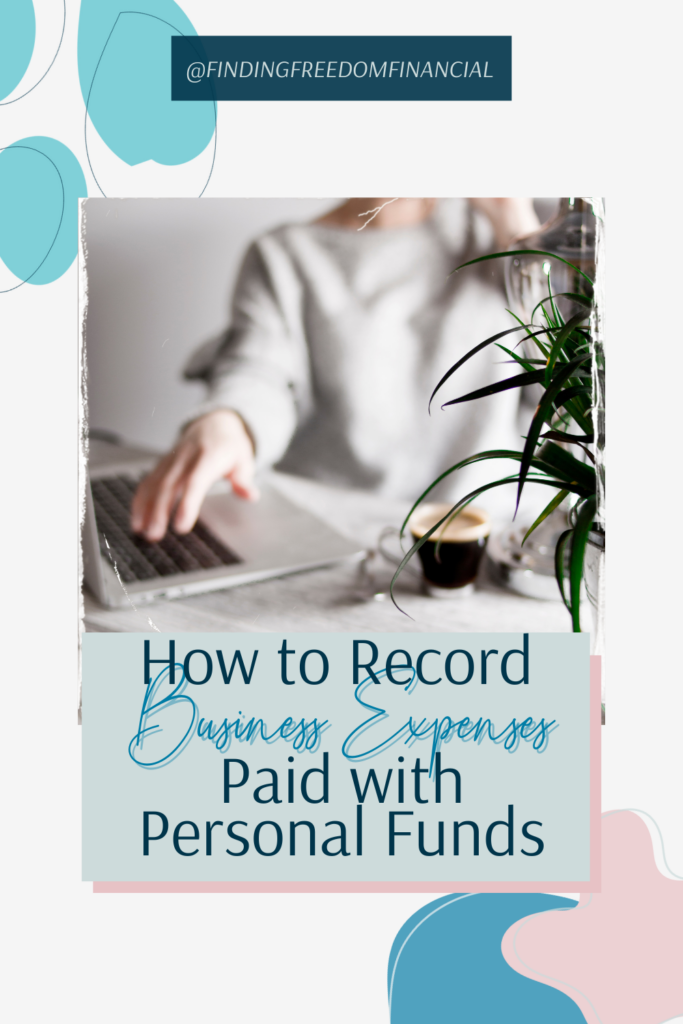How to Record Business Expenses Paid with Personal Funds
Life happens and sometimes you may need to use personal funds to pay for business expenses. The lingering question you may have is how to handle business expenses paid with personal funds. This situation is more common than you might think, especially for small businesses. Today, I’m sharing some practical advice on how to record these expenses accurately and efficiently.

Why It Happens
Before diving into the “how,” let’s quickly touch on the “why.” Sometimes, using personal funds for business expenses is unavoidable. Maybe the business account is temporarily low on funds, or maybe you accidentally swiped the wrong card while you were out buying supplies. Regardless of the reason, it’s crucial to track these expenses properly to ensure your books stay accurate and your financial reports reflect the true state of your business.
The Steps to Recording Business Expenses Paid with Personal Funds
Keep Detailed Records
The first step is to maintain meticulous records. Whenever you use personal funds for business expenses, save the receipt and note down the details. Record the date, amount, and purpose of the expense. If possible, jot down why you used personal funds instead of the business account.
Create a Reimbursement Form
If you want the business to reimburse you, then develop a simple reimbursement form or template. (There’s free ones in Excel). This form should include fields for the date, description of the expense, amount, and the type of expense/purchase account to be recorded. This documentation will serve as a paper trail and help ensure everything is accounted for properly.
Record the Expense in Your Accounting System
In your accounting software, create a journal entry to record the business expense. Here’s a basic example of how you might do this:
- Debit the relevant expense/purchase account (e.g., Office Supplies, Travel Expenses).
- Credit the Owner’s Contributions account.
This entry shows that the business has incurred an expense, and the owner has contributed personal funds to cover it.
Reimburse Yourself
Again, if want to reimburse yourself, you can transfer the amount from your business account to your personal account to pay your self back Record this transaction in your books by:
- Debit the Owner’s Contributions account.
- Credit the business bank account.
This way, your business records will reflect that you’ve paid yourself back for the expense.
Track Reimbursements Carefully
Be diligent about tracking reimbursements to avoid duplicating expenses. A good practice is to schedule regular reviews (monthly or quarterly) to reconcile these transactions and ensure everything is aligned correctly.
Common Mistakes to Avoid
Mixing Personal and Business Expenses
Even if you occasionally use personal funds for business expenses, try to avoid mixing personal and business transactions as much as possible. This separation simplifies your bookkeeping and makes tax time much easier. Plus, if you operate under an LLC, mixing business & personal can void your LLC.
Failing to Document
Always document your expenses thoroughly. Lack of proper documentation can lead to inaccuracies in your financial records and complicate tax reporting.
Neglecting Reimbursements
If you decide to reimburse yourself, don’t let these transactions slip through the cracks. Regularly review your books to ensure all reimbursements are accounted for.
To Wrap it Up
Using personal funds for business expenses happens sometimes, but it doesn’t have to be a headache. By keeping detailed records, using a consistent system to document and record expenses, and ensuring accurate reimbursements, you can maintain clear and accurate financial records. Remember, good bookkeeping practices not only keep you organized but also provide valuable insights into your business’s financial health.
Hi, I’m Megan!
Bookkeeping for the retail industry has some unique complexities that take extra time to manage to ensure accuracy. At Finding Freedom Financial Services, I provide done-for-you bookkeeping services for boutique owners that accurately track these complexities for you so you can have more time and focused energy to dedicate to running your stores. If you’re ready to get your time back, apply to work with me today!
